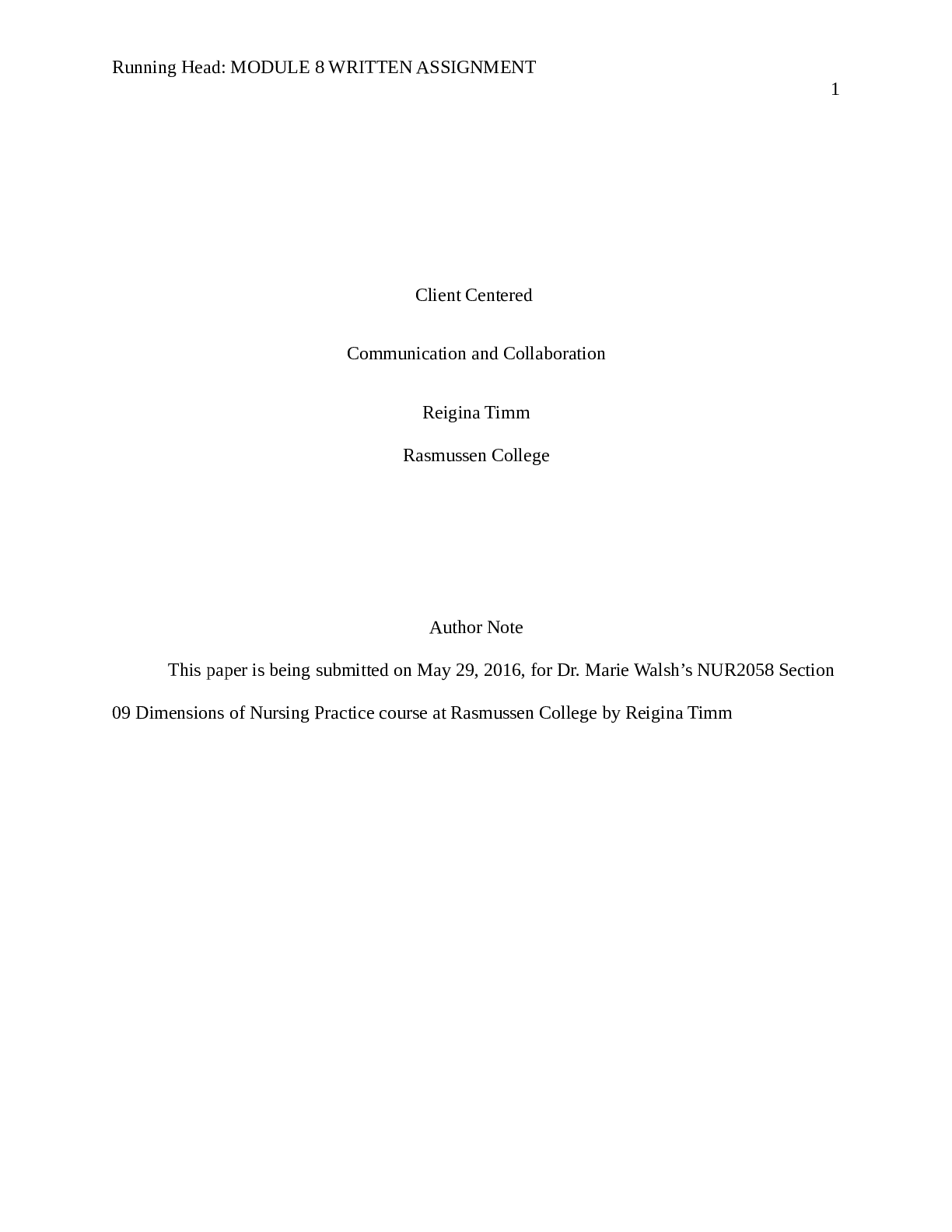Author Note
This paper is being submitted on May 29, 2016, for Dr. Marie Walsh’s NUR2058 Section
09 Dimensions of Nursing Practice course at Rasmussen College by Reigina Timm
MODULE 8 WRITTEN ASSIGNMENT 2
The Case of Mrs. G.
Mrs. G.’s Feelings
Family is a significant social organization system in the Mexican-American culture. "The
concept of familism is an all-encompassing value in the Mexican-American culture, where the
traditional family is still the foundation of society" (Eggenberger, Grassley, Restrepo, 2006). The
valuing of family considerations over individual needs permeates the literature concerning the
Mexican-American family culture. Mexican-American family socialization emphasizes the needs
of the whole family with an expectation of loyalty from each family member. The child-rearing
practices of this culture foster the growth of self-identity embedded within the milieu of the
familia (family) (Giger & Davidhizar, 2004). Based on the information provided, Mrs. G. seems
to follow these social norms and highly values family. She and her husband had 5 children, more
than your average family, which reaffirms her “need” to be surrounded by family. Mrs. G. likely
feels extremely lonely and possibly even abandoned because 4 of her children and their families
live out of state so she does not see them and get to be an active part of their lives.
Social support literature suggests that Mexican-Americans receive support from their
nuclear and extended families during both daily events and crises (Kemp, 2001; Niska, 1999).
Many decisions, including those concerning individual health care, are made by the family.
Seeking guidance with personal problems appears to be gender linked in the Mexican-American
culture with older Mexican-Americans often relying on their daughters for assistance with health
problems (Niska, 1999). This is seen in Mrs. G.’s case. Mrs. G. only has one child that lives near
her, which happens to be her daughter. Her daughter is the one who has been seeking out
solutions to her concerns about her mother and actively taking steps to implement the plan she
has determined is best for her mother.
MODULE 8 WRITTEN ASSIGNMENT 3
It seems clear by the statements made about Mrs. G. wishing to spend more time with her
home care nurse that Mrs. G. seeks, thrives and relies on close personal attachments. Mexican�American families rely on their extended family network and become involved in
intergenerational helping networks (Niska, 1999). Strong ties extend beyond the nuclear family
to a cohesive extended family of grandparents, cousins, aunts, uncles, and godparents. Niska
suggested that Mexican-American family socialization cultivates multigenerational family
contacts and frequent face-to-face communication within the entire family network. Close
intergenerational networks often result in Mexican-American families living in close proximity
with an extended family (Niska; Zoucha & Purnell, 2003). Because all but one of Mrs. G.’s
children and their families live out of state, she has been “deprived” of this traditional lifestyle.
Mrs. G. might feel as though something is missing or unfulfilled in her life due to this.
The male in the Mexican-American culture is often viewed as the authority in the family
(Burk et al., 1995). This way of thinking/tradition helps explain the void Mrs. G. is feeling with
the loss of her husband. The woman is often viewed as the force holding the family together and
sharing cultural wisdom (Kemp, 2001). Mrs. G. might feel as though she has failed her family
and husband because her children all live away from each other so in theory she has not “held
them together”.
Read More
.png)

